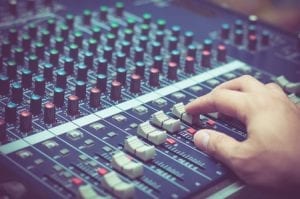Tips Every Sound Engineer Wished Performance Artists Knew!

Bill Holmes’s career spans more than thirty-five years in sound production, recording, design, and engineering. He has engineered and developed sound in venues, here and abroad ranging from live theatre, clubs, and large concerts. He is currently adjunct professor of Recording Technology and the Recording Engineer for Lehigh University’s Music Dept. We asked Bill to assemble a list of “tips” that sound engineers wished performance artists knew.
Capitalize upon a creative collaboration that tethers the artist and the engineer.
Good sound engineers are as artistically invested in an excellent performance as the performers are. Because of the nature of technology sound engineering can be looked upon as a service the engineer performs. In actuality, the best performances always eventuate when more of a communion exists between the sound techs and the performers. An initial overarching conversation between the performer and the engineer can draw everyone into the same artistic expectation.
Give a thorough rundown of the instruments and vocals coming on stage.
Take a minute during setup to describe how many vocal mics, DI’s, amp mics, or other inputs your band will need. Indicate where you want every player to be situated on stage. Even better, bring along a quick printout that diagrams your stage setup with clear markings for each type of input.
Offer a set list that marks each instrumental change.
Is the guitarist switching instruments at various points during the set? Do the lead vocalists vary from song to song? Any surprise guests sitting in? it’s exciting to surprise the audience. The sound engineer . . . not so much!
After you are set up, don’t haphazardly unplug anything.
Crackle, pop, wince! Until the sound engineer has given you the all clear indicating they have muted your channel, don’t pull an instrument or mic cable from its input.
Don’t ask the audience how it sounds.
Mixing live sound isn’t something to be crowd sourced. When you ask everyone else, it’s an insult to your sound tech. Trust that they know the room and its acoustical properties. The sound tech rarely enjoys having a well-meaning friend or mother inform them that your instrument isn’t loud enough.
Need more monitor? Ask over the mic.
Mysterious hand signals can’t be deciphered by a normal human sound engineer. If you need more monitor, use your microphone to ask for it. Specify what you need – more keys, deeper bass, more of yourself. The engineer really wants the mix perfected.
Realize that if your amp is too loud, the engineer can’t control the room mix.
Nothing wrecks the sound of a set like an amp set at an inflated volume. A good sound engineer realizes that the way to correct it is not to bring the PA up to stadium levels. Set your amp so that it is loud enough to hear yourself comfortably. Then let the tech ride the faders to fit you in the mix. In smaller rooms guitarists are usually best playing through a low wattage amp then allowing level controls to the engineer.
Make sure you have adequate gear in good working order.
Ascertain before the gig that all of your equipment is performance ready. Have a backup stock on hand . . . cables, batteries, spare drumsticks, etc.
And here is a tip about a tip.
A tip to the sound engineer after a performance, especially, in venues where you are a repeat performer, goes a long way to forging a collaborative relationship. From her earliest career days, this was Dolly Parton’s MO. I can hear your response from here. Who tips a sound tech? Exactly! At least offer to buy a drink. You will be remembered and thanked in sonic goodness the next time you take the same stage.
You can visit bill at his website. www.williambholmes.com.
Sage Audio - Wise. Sound. Matters.




